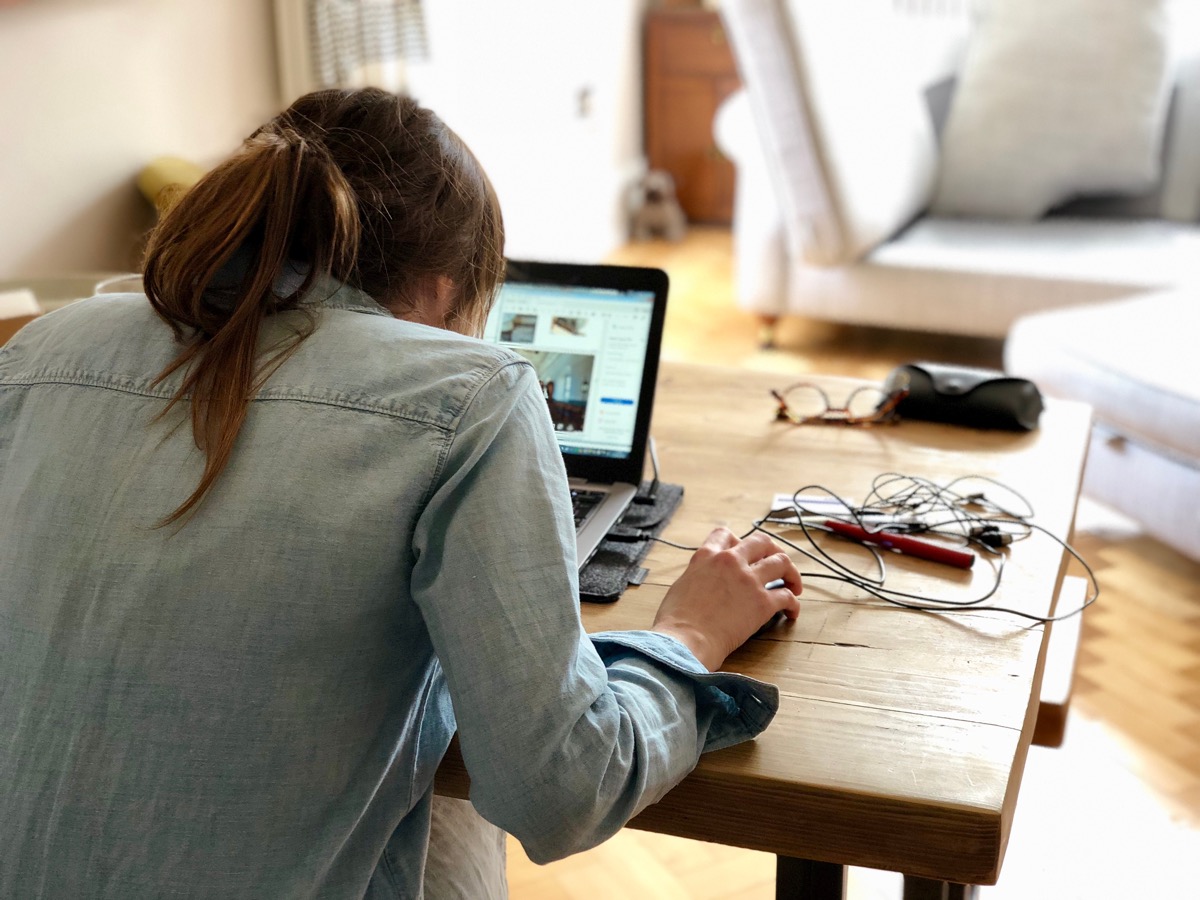6 Things Your Lower Back Wishes You’d Stop Doing, According to Doctors

Back pain is a surprisingly common problem among Americans. In fact, according to a 2021 report from the Centers for Disease Control and Prevention (CDC), nearly 40 percent of adults surveyed in the U.S. reported having back pain within the last three months, making it the most common site for chronic pain. The good news? Experts say there are several ways you can improve your back pain, especially if it occurs in your lower back. Read on to learn the six things your lower back wishes you’d stop doing, so you can establish good back health habits starting now.
READ THIS NEXT: If You Sleep in This Position, You Could Be Hurting Your Spine, Experts Warn.
1
Sitting for too long

One of the worst things you’re probably doing for your lower back health is sitting for long periods of time. “Prolonged sitting is terrible for spine health,” says Matthew Chong, MD, an orthopedic surgeon at Cedars-Sinai Kerlan-Jobe Institute in Los Angeles.
He explains that the spine is designed to spend most of its time in an elongated position, which allows the body to efficiently deliver oxygen, blood, and nourishment to the surrounding muscles, vertebrae, and discs. “Sitting on a couch, on a bed, or other soft surfaces for prolonged periods, the spinal vertebrae become compressed and shrunken in on themselves,” Chong tells Best Life.
However, you should be able to offset the effects of sitting for prolonged periods by taking frequent movement breaks, says Neel Anand, MD, MCh Orth, a professor of orthopedic surgery and director of spine trauma at Cedars-Sinai Spine Center in Los Angeles. “If you want to avoid the pain and strain on your spine and plan to sit for a long duration of time, make sure you take breaks,” he says. “If you’re watching a show or are at your desk, get up frequently and stretch. It really is that simple,” Anand adds.
READ THIS NEXT: I’m a Pharmacist, and This Is the Pain Reliever I Recommend.
2
Stressing out

When you’re stressed out, “a cascade of health effects can follow,” says Anand. “Feelings are powerful and can lead to significant muscle tension, especially in the back and neck muscles. Depression and anxiety can further aggravate that tension,” he says.
That’s why it’s important to discuss both your distressing emotions and any physical symptoms you may be experiencing with your doctor. “If you are feeling considerable stress and also battling back pain, the two might be related,” he explains. “Talk to your doctor or mental health professional about healthy ways to cope with life’s stressors so that they don’t cause damage to other aspects of your overall health.”
3
Wearing shoddy shoes

Another thing your lower back wishes you’d stop doing is wearing the wrong shoes, which can come in all shapes and styles. “Contrary to popular belief, high heels aren’t the only footwear culprit that can wreak havoc on your back,” says Anand.
He explains that any shoes that are old, flat, or lack adequate arch support can significantly contribute to lower back pain. Give your spine the support and stability it needs by investing in and wearing properly fitted and supportive shoes, Anand advises.
4
Having poor posture

Your posture can also have a tremendous impact on your lower back health—and Anand says there are two key ways you can harm your back while sitting. “Your mom wasn’t totally wrong; hunching can certainly be bad for your back,” he explains. “But the opposite is true too. Sitting up straight for too long without a break can also cause strain.”
If you work in an office setting, Anand advises making sure your chair is at a height where your knees are at a 90 degree angle, your feet can rest flat on the floor, and you have proper lower back support. “Make sure to stand up, stretch, and take a quick walk several times a day to keep from getting stiff or causing injury,” he adds.
For more health news sent directly to your inbox, sign up for our daily newsletter.
5
Sleeping on the wrong mattress

You can also harm your lower back while lying down if you have the wrong type of mattress. “Back pain sufferers can actually experience greater pain if their mattress is too firm because it puts more pressure on heavy points like the hips and shoulders,” he explains. “Conversely, a mattress that is too soft could lack the support necessary to allow proper movement. In both cases, the person wakes up stiff and in pain,” he says.
If you already suffer from back pain, opt for a medium-firm mattress, which Anand says is most likely to offer the ideal amount of support.
6
Running on the wrong pavement

Running can help strengthen your bones and muscles, ultimately making injury less likely. However, running on the wrong pavement can cause a range of health problems, including lower back pain.
“Whether it’s concrete or paved asphalt, running on hard ground is incredibly hard on your joints and spine,” says Anand. He adds that people who run solely on pavement may have a higher incidence of back pain from running long-term, not to mention higher incidence of stress fractures, inflammation, and shin splints. If you run regularly, consider incorporating runs on gentler surfaces which can absorb some of the shock to your bones, joints, and muscles. Your lower back will thank you later.
Best Life offers the most up-to-date information from top experts, new research, and health agencies, but our content is not meant to be a substitute for professional guidance. When it comes to the medication you’re taking or any other health questions you have, always consult your healthcare provider directly.